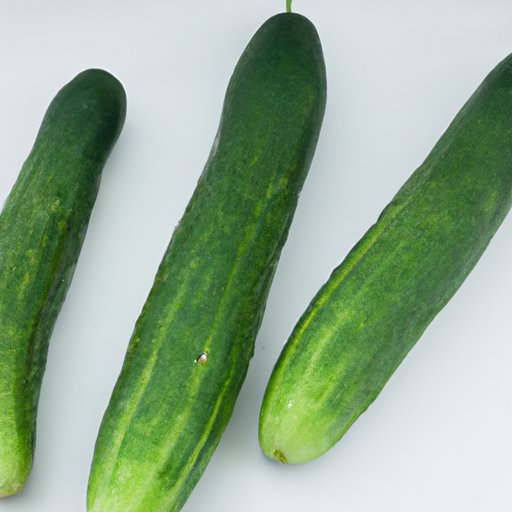Introduction
Cucumbers are a popular vegetable, often found in salads, sandwiches, and other dishes. But do cucumbers have any nutritional value? In this article, we’ll explore the nutritional benefits of cucumbers and look at the scientific evidence behind them to determine whether cucumbers are worth adding to your diet.
A Comprehensive Overview of Cucumber Nutrition
Cucumbers are incredibly low in calories, making them an excellent choice for weight loss or if you’re trying to reduce your calorie intake. One cup of sliced cucumbers contains just 16 calories, so you can easily enjoy cucumbers without worrying about overindulging. Additionally, cucumbers are high in water content, which helps keep you hydrated and feeling full.
Cucumbers are also a good source of vitamins and minerals. They contain vitamin C, vitamin K, folate, potassium, magnesium, and manganese. Vitamin K is especially important for bone health, and folate is essential for healthy cell growth. Potassium helps regulate blood pressure, while magnesium and manganese play a role in energy production.
In addition to these vitamins and minerals, cucumbers also contain antioxidants and phytochemicals. Antioxidants help protect your cells from damage caused by free radicals. Phytochemicals, such as lignans and cucurbitacins, may help protect against certain diseases, including cancer. Finally, cucumbers are a good source of dietary fiber, which helps keep your digestive system running smoothly.

How to Maximize the Nutritional Value of Cucumbers
To maximize the nutritional value of cucumbers, it’s best to eat them fresh and unpeeled. The skin of the cucumber contains most of the fiber and many of the vitamins and minerals, so peeling it will reduce the overall nutritional value. Additionally, cucumbers are best enjoyed raw or lightly cooked, as cooking can decrease the amount of some vitamins and minerals.
Finally, it’s important to choose cucumbers that are firm and have a dark green color. Avoid cucumbers that are soft or have blemishes, as these may be spoiled. If you’re buying pre-cut cucumbers, make sure they’re stored properly and avoid any that look slimy or smell bad.

The Surprising Health Benefits of Eating Cucumbers
Eating cucumbers has a number of surprising health benefits. For example, cucumbers are known to reduce inflammation, which can help with joint pain, headaches, and other ailments. They’re also thought to improve digestion and help prevent constipation. Additionally, cucumbers are known to help detoxify the body and improve skin health due to their high water content.
According to a study published in the journal Nutrition Research, cucumbers may even help lower blood sugar levels. The study found that cucumbers are rich in polyphenols, which are compounds that can help reduce glucose absorption in the gut. As a result, cucumbers may help those with diabetes or prediabetes better manage their blood sugar levels.

A Scientific Look at the Nutritional Properties of Cucumbers
Now that we’ve explored the potential health benefits of eating cucumbers, let’s take a closer look at the nutritional properties of this versatile vegetable.
Vitamins and Minerals in Cucumbers
Cucumbers are a good source of several essential vitamins and minerals, including vitamin C, vitamin K, folate, potassium, magnesium, and manganese. All of these nutrients are important for maintaining good health. Vitamin C helps boost the immune system, while vitamin K is essential for bone health. Folate helps with cell growth and development, while potassium helps regulate blood pressure. Magnesium and manganese are both involved in energy production.
Antioxidants and Phytochemicals in Cucumbers
Cucumbers also contain antioxidants and phytochemicals. Antioxidants help protect your cells from damage caused by free radicals, while phytochemicals, such as lignans and cucurbitacins, may help protect against certain diseases, including cancer. Additionally, cucumbers are a good source of polyphenols, which can help reduce glucose absorption in the gut.
Fiber Content of Cucumbers
Finally, cucumbers are a good source of dietary fiber. Fiber is important for keeping your digestive system running smoothly and helping you feel full. It also helps reduce cholesterol levels and may even help reduce the risk of certain types of cancer.
Conclusion
Cucumbers are an incredibly nutritious vegetable, offering a wide range of vitamins and minerals, antioxidants, phytochemicals, and dietary fiber. Eating cucumbers can help reduce inflammation, improve digestion, detoxify the body, and even lower blood sugar levels. To maximize the nutritional value of cucumbers, it’s best to eat them fresh and unpeeled and choose cucumbers that are firm and dark green.
(Note: Is this article not meeting your expectations? Do you have knowledge or insights to share? Unlock new opportunities and expand your reach by joining our authors team. Click Registration to join us and share your expertise with our readers.)
